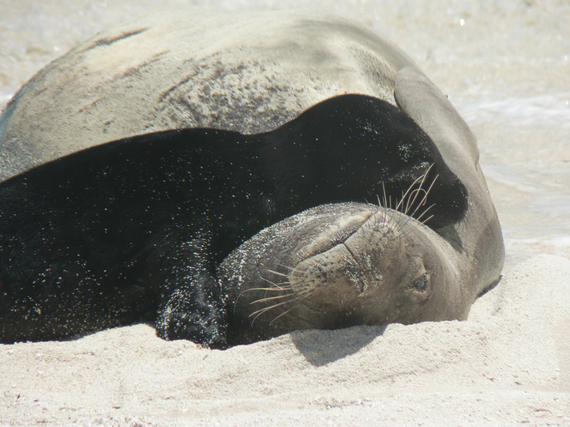There are less than 1,200 Hawaiian monk seals left in the world. Without intervention and sufficient help, within a generation, the species could be extinct.
For one of only two warm water seals left on earth, that would be a sad end.
Monk seal thrived in the oceanic waters and coral reefs of the Hawaiian Islands for an estimated 13 million years, undisturbed by man or man-made ocean degradation. Today, the Hawaiian monk seal is critically endangered due to a variety of human caused factors; the species headed towards extinction.
Hawaiian monk seal are the most endangered marine mammal that lives solely in U.S. waters. Hence, its fate depends solely on our actions. In the last 50 years, the Hawaiian monk seal population has declined by more than 60% and is now at its lowest level in recorded history.
The National Oceanic and Atmospheric Administration (NOAA) has the fate of the seal in its hands as it runs the program that is responsible for endangered marine mammal recovery. Unfortunately, NOAA seems to be pulling its critical support at a time when the recovery program is finally turning the tide on monk seal losses.
Despite the hard won and significant successes of NOAA scientists in the last several years that have reduced the rate of monk seal decline to almost zero in the larger population that lives in the Northwest Hawaiian Islands, spending on the monk seal for this year includes a cut of $1 million from last year's amount, a decrease of 30%.
The spending cuts will eliminate a substantial amount of the recovery effort and research taking place in the Northwestern Hawaiian Islands, where the population continues to struggle for survival and important programs to protect the growing seal populations in the main Hawaiian Islands. It seems foolish for NOAA to sabotage its own legally mandated program.
The cut is particularly mystifying since spending for all marine mammals went up by more than $2 million this year, and the fisheries agency of NOAA responsible for the seal among other things received an increase of approximately $100 million.
As with many endangered species recovery efforts, the cost of recovering depleted species is not cheap. What man has decimated over decades or centuries takes time and money to restore. The federal government has not shied away from expending funds for Pacific salmon, the Steller sea lion, the right whale, the gray wolf and the bald eagle. Indeed, this is what the law requires.
Groups are rallying to stop the budget cuts. The Marine Conservation Institute and the Monk Seal Foundation have both launched petitions to stop the devastating cuts. Marine Conservation Institute's petition can be found here.
While the politics and human dimensions of wildlife management are often complex, extinction itself is eerily simple: once a species is gone, it's gone forever.
Extinction would be an awful thing to allow to happen on our watch since Hawai'i and the U.S. government are exclusively responsible for the Hawaiian monk seals' recovery, or demise.
Disclosure: Marine Conservation Institute is a U.S. nonprofit organization that works with partners around the world to protect essential ocean places and the wild species in them. Since 2007, Marine Conservation Institute has advocated for the protection and recovery of the Hawaiian monk seal. The author works with Marine Conservation Institute on their conservation project for the Hawaiian monk seal.

